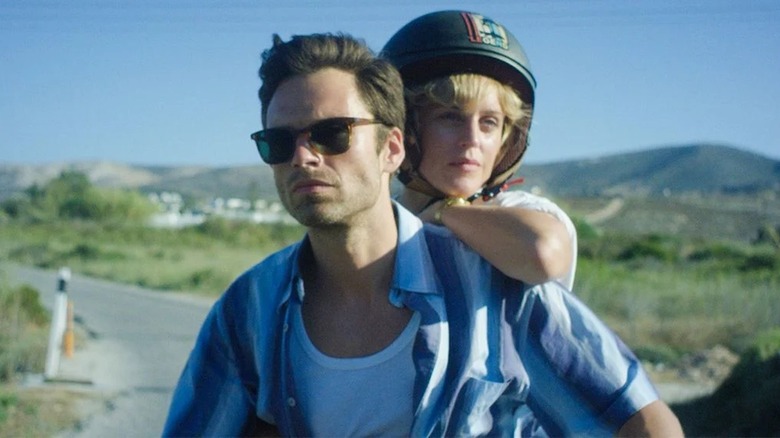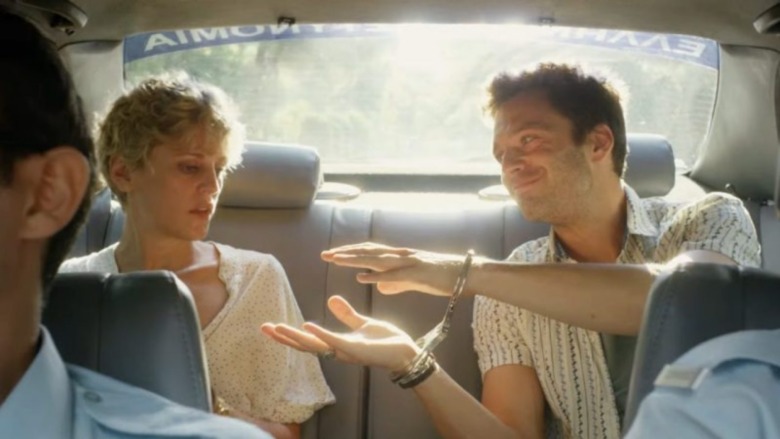Monday Review: Fools In Love
The best romance films live or die on the backs of strong chemistry between the two leads and evocative writing to sell the pull between their characters. Monday, the new drama from Greek writer/director Argyris Papadimitropoulos, unfortunately fails on both accounts. Despite their respective talent and the undeniable screen presence they each possess on their own, the film's central lovebirds (played by Sebastian Stan and Denise Gough) don't quite gel together well enough to carry the picture. But even that wouldn't be an insurmountable criticism if the film possessed the nuance and complexity necessary to follow through on its narrative aims.
This is a cautionary tale of the fast love that forms between two self-destructive individuals living abroad, but it never finds a way to harness its dramatic energy in any meaningful or affecting way. In real life, some relationships are such catastrophic train wrecks that you can't look away from the toxic spectacle. But in a movie, that same level of schadenfreude isn't enough to sustain a two-hour picture that doesn't seem to be aware of how tiring its core interactions can be to watch on repeat.
Monday then becomes an unpleasant experience to partake in, one with a handful of engaging moments scattered so far apart they can't sufficiently support the weight they're expected to brace.
Hey, I just met you...
The film's meet-cute takes place, as they often do, at a party. We meet these two woefully mismatched lovers on the dance floor in Greece — stuffy and stunted DJ Mickey (Stan) and drunk, weeping Chloe (Gough) — as the latter catches the former's eye from across the room. Mickey's impulsive friend Argyris plays matchmaker, literally and physically thrusting the two together, leading to the duo waking up naked on a beach the next morning, hung over and arrested for public indecency.
A series of logistical hurdles keep the two together from that Friday night party to the Monday morning reality, from Chloe needing to retrieve her missing purse to being locked out of her apartment. These opportunities keep two otherwise incompatible expats locked in one another's orbit, sporadically hooking up in various locations to strengthen their tenuous tether.
It could be an intoxicating and off-kilter approach to the genre if it wasn't so chock full of eye-rolling tropes. This is, it must be said, a movie whose narrative is fully kicked in once Mickey literally stops Chloe at the airport from leaving Greece behind.
That cyclical back and forth forms the backbone of the film. The narrative spine is a recursive loop yo-yo'ing from the freewheeling excess that begins the weekend to the sobering realizations that always arrive a little too late Monday morning. But for much of the film's first half, the goings-on are just a little too repetitive.
We learn more about Mickey and Chloe. There's Mickey's frustrating man-child tendencies, his insistence on befriending the most regressive and mischievous grown adults imaginable, and his estranged relationship with the young son he rarely sees. He's a struggling musician failing to thrive not because he lacks talent or connections, but because he's stubborn and incapable of being a useful collaborator.
Chloe, by comparison, at least has her life together. She's an immigration lawyer coming off a bad breakup and using her animalistic attraction to perpetual fixer-upper Mickey as a project to focus on in lieu of processing her own emotions. They, very luckily, have compatibly horrific coping mechanisms! But even as they are clearly ill-suited for one another, the film does a fantastic job of staging their many make-out sessions and afternoon quickies with sunlit cinematography and smooth needle drops to act as diegetic dopamine hits.
Every time the viewer's brain is reminded this is doomed to fail at best and potentially ruinous at worst, the two pretty people start hooking up to the strains of some cool tunes and the façade resets itself.
...and this is crazy!
A good cinematic romance introduces two people we the audience know in our hearts belong together, then contrives dramatic reasons to keep them apart. But the more time we spend with Mickey and Chloe, as we watch her life consumed by his messy world of drunken buffoonery and chaos, we can ascertain for a fact that these two belong as far apart as humanly possible, no matter how pleasing their bodies look together.
So it's no surprise Monday begins to truly hit its stride in its second act as Chloe slowly comes to this realization herself. Gough does a solid job of portraying a put-upon woman putting too much of herself into the wrong project, while Stan stretches his serviceable amounts of charisma a hair too thin in trying (and failing) to make Mickey likable enough to forgive his outsized foibles. If the film spent less time beating the viewer over the head with the earlier, messy elements of this toxic courtship and got to this junction faster, Monday would be a sobering drama born from the fleeting allure of love at first sight.
But by the time we get to this part of the story, it's hard not to be actively rooting for them to break up. Perhaps the filmmakers were aware of this, because it's here that they start to throw in various developments — some melodramatic, others genuine — that make us question our pessimism. Exploring Chloe's earlier offscreen break up and introducing her slimy and detestable ex feel like narrative choices designed to make Mickey seem not so bad by comparison, to remind viewers that both figures are using one another in their own way.
Sadly, the film can't quite stay the course following this self-immolating cycle to its logical conclusion, unsure of the sort of story it wants to tell or the kind of statement it wants to make.
Even within that morass, however, there's time for one last gasp of interest. There's a sequence late in the film when some unfortunate revelations come to the fore and the characters, though deeply intoxicated and under the influence of cocaine, must confront how far off the deep end their mutually destructive tendencies have brought them. It leads to a rather stirring set piece that feels like the riotous death throes of whatever remaining passion drives them ever closer to interpersonal oblivion — a raucous and painful series of moments following them ruefully retracing the steps of their original meeting, but this time, their flagrant abandon yields more devastating results.
In those moments, it feels as though Monday might defy the odds and stick the landing, but the film's finale leaves so much to be desired, petering out rather than coming to anything resembling a cathartic or consequential conclusion. If the overall objective was to leave the viewer as dissatisfied and worn out as its lead characters, then kudos. Hats off to the lot of them. But it's a crummy and hollow way for such a tale to unfold.


